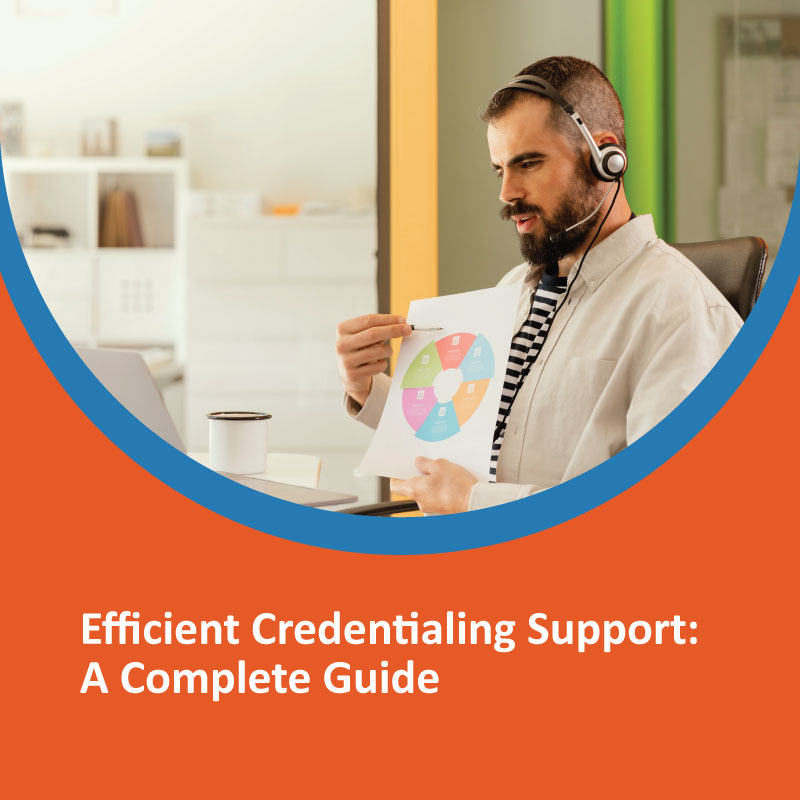Efficient Credentialing is important as it checks whether people have the right qualifications and certifications. Many sectors, like healthcare and finance, need it to keep people safe and maintain trust. However, it’s a complicated and time-consuming process. It involves collecting documents and verifying information. It also ensures compliance with regulations. Inefficient processes cause delays and risks.
Efficient credentialing support streamlines this process. Medical Credentialing helps organizations manage credentials better. It reduces manual work and ensures compliance. The right tools can save time and minimize errors, making operations more efficient.
Understanding Efficient Credentialing and Its Importance
Why Credentialing Matters
Credentialing is very important. It checks whether professionals have the right skills. It prevents fake qualifications and ensures people are qualified for their jobs. Without it, organizations can face legal problems and damage their reputation.
For example, in healthcare, doctors need to prove they’re qualified. Hospitals and insurance companies check their licenses and certifications. This ensures patients get proper care. Similarly, schools verify teachers’ qualifications to maintain good education standards.
Challenges in the Credentialing Process
Credentialing involves multiple steps, including verification, documentation, and approval. Some common challenges include:
Time-Consuming Paperwork: Manual verification can take weeks or months, delaying hiring or practice approvals.
Regulatory Compliance: Different industries have unique credentialing requirements that frequently change.
Document Management: Storing and tracking credentials manually can lead to lost or outdated records.
Errors and Inconsistencies: Manual data entry can lead to mistakes. Mistakes delay the process.
To avoid this, organizations need efficient solutions. These solutions make the process simpler and faster.
What Is Efficient Credentialing Support?
Key Features of Credentialing Support Services
Efficient credentialing support services provide:
Automated Verification: Reduces manual work by instantly checking credentials against databases.
Digital Documentation: Stores all credentials in a secure cloud-based system.
Compliance Monitoring: Ensures credentials remain up to date and meet regulatory requirements.
Real-Time Tracking: “Real-time tracking” means getting updated information on a doctor’s credentials instantly. Automated systems check official sources continuously, giving immediate updates on a doctor’s license and certifications. This reduces delays and makes the process more accurate.
Manual vs. Automated Credentialing:
Old credentialing methods use paper, phone calls, and emails. These methods are slow and often have mistakes, and they are not very efficient.
Automated credentialing uses technology to streamline the process. It verifies documents electronically, reducing delays and administrative burdens. Automation also minimizes human errors and ensures faster approvals.
Benefits of Streamlined Credentialing
Efficient credentialing support offers multiple advantages:
Saves Time: Reduces the time spent on manual verification and paperwork.
Minimizes Errors: Automation reduces human mistakes, ensuring accurate credentialing.
Enhances Compliance: Keeps organizations updated with changing regulations.
Improves Productivity: Allows HR and administrative teams to focus on core responsibilities.
How Technology Enhances Credentialing Efficiency
Role of AI and Automation in Credentialing
Artificial Intelligence (AI) plays a vital role in modern credentialing systems. AI-powered tools can:
- Scan and verify documents instantly.
- Identify missing or incorrect information.
- Flag potential compliance issues.
Automation speeds up the credentialing process, making it more accurate and efficient.
Cloud-Based Credentialing Systems
Cloud technology allows organizations to store and manage credentials digitally. Benefits of cloud-based credentialing systems include:
Easy Access: Credentials can be retrieved from anywhere at any time.
Better Security: Encryption and access controls protect sensitive data.
Automatic Updates: Credentials are updated in real-time, reducing the risk of expired certifications.
Data Security and Compliance
Credentialing involves sensitive personal and professional data. Organizations must follow strict security protocols to protect this information. Secure credentialing systems:
- Protect data with encryption.
- Follow rules like HIPAA and GDPR.
- Keep track of credentialing with audit trails.
The Role of Third-Party Credentialing Services
Outsourcing Credentialing Saves You Time:
Managing credentialing in-house can be overwhelming. Outsourcing to third-party credentialing services helps organizations:
- Reduce administrative workload.
- Make credentialing faster.
- Follow industry rules.
Compliance and Risk Management
Credentialing service providers specialize in compliance. They monitor regulatory changes and ensure that professionals meet the latest requirements. This reduces legal risks and enhances operational efficiency.
Choosing the Right Credentialing Service Provider
When selecting a credentialing service provider, consider:
- Industry expertise and experience.
- Security measures and compliance capabilities.
- Customer support and responsiveness.
- Integration with existing HR or credentialing systems.
Choosing the right provider ensures seamless credentialing and long-term efficiency.
Best Practices for Efficient Credentialing
Organizing and Updating Documentation
Maintain an organized digital record of all credentials. Regularly update expired or renewed documents to avoid compliance issues.
Training Staff on Credentialing Requirements
Educate HR and administrative teams on credentialing procedures. This helps streamline the process and reduces delays.
Conducting Regular Audits and Compliance Checks
Regularly check professionals’ certifications and use reminders for renewal dates to ensure they are valid and up to date.
Conclusion
Efficient credentialing support is critical in the medical field as well. It helps organizations follow rules, reduce paperwork, and work more efficiently. Using technology and automation can simplify credentialing. It also helps ensure accuracy. Regular audits and staff training are also helpful. They improve efficiency and reduce mistakes. With good credentialing support, organizations can save time and reduce risks. They can focus on their primary goals.
FAQs
1. What is credentialing, and why is it important?
Credentialing is the process of verifying qualifications and certifications. It ensures compliance, prevents fraud, and builds trust in professional industries.
2. How can technology improve the credentialing process?
Technology automates verification, stores documents digitally, and sends renewal reminders. It speeds up the process and reduces errors.
3. Should organizations outsource credentialing support?
Outsourcing can save time, reduce administrative workload, and ensure compliance. It allows experts to handle credentialing efficiently.
4. What are common challenges in credentialing?
Common challenges include manual paperwork, outdated documents, compliance risks, and slow verification processes. Efficient credentialing support overcomes these issues.

